Kenya police issue protest ban in central Nairobi
By Aoife Hilton with wires
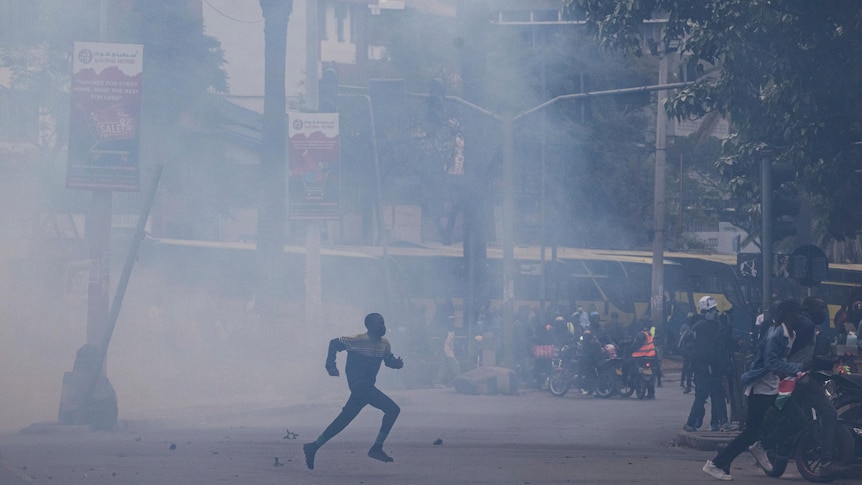
Protests broke out on June 18 after legislators passed a
finance bill that would raise taxes. (AP: Ed Ram
In short:
Kenya's police have banned demonstrations in the heart of the capital Nairobi after weeks of anti-government protests.
President William Ruto fired almost all of his cabinet last week in response to activists' demands surrounding a bill which would raise taxes, but demonstrations continued.
What's next?
Leading figures behind the protests have rejected an offer for "multi-sectoral" talks and have called on people to gather at Uhuru Park adjacent to Nairobi's city centre.
Kenya's police have banned demonstrations in the heart of the capital Nairobi after weeks of anti-government protests.
Protests broke out on June 18 after legislators passed a finance bill that would raise taxes.
Demonstrators accuse Kenya's officials of incompetence, corruption and displays of opulence while ordinary people suffer from a cost-of-living crisis.
"We are asking genuine questions. Where is accountability? Where is governance?" protester Daniel Wambua says.
Activists have blocked major roads including the highway to Namanga on the outskirts of Nairobi, while demonstrations have also broken out in the towns of Mombasa, Kisumu and Eldoret.
Activists will not stop until president steps down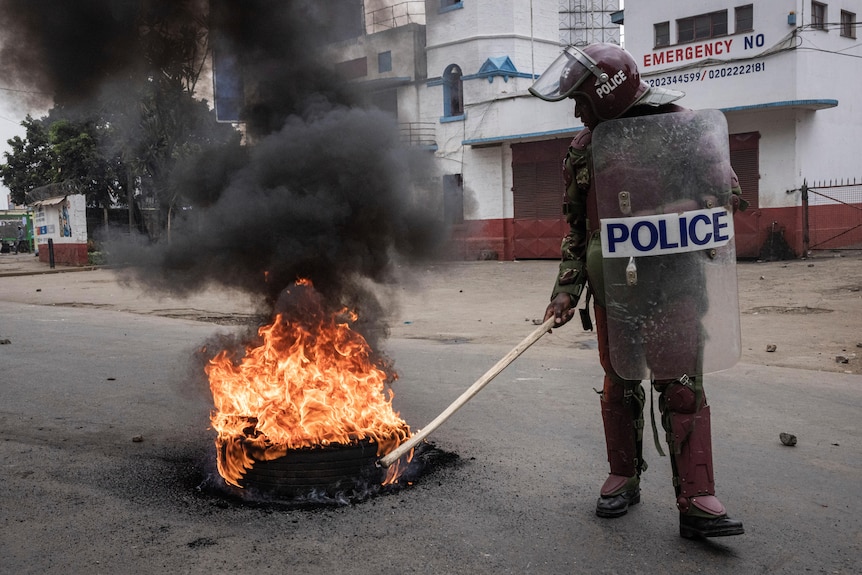
Police opened fire on demonstrators at parliament on June 25, killing several people.(AP: Ed Ram)
The rallies, organised online and led by youth activists, began peacefully but later turned violent.
At least 50 people have died and 59 have been abducted or declared missing since demonstrations began, according to The Kenya National Commission for Human Rights.
Some demonstrators briefly stormed parliament and began looting on June 25. The police opened fire, killing several people.
Last week, President William Ruto withdrew the legislation and fired almost all of his cabinet.
The head of the police, who has been accused of brutality toward the demonstrators, resigned last Friday.
Demonstrations continued, with activists saying they will not stop until Mr Ruto steps down.
Mr Ruto also pledged to set up a broad-based government last week, but the opposition coalition on Wednesday rejected the idea — calling instead for a constitutional convention.
Protests infiltrated by organised crime, officials say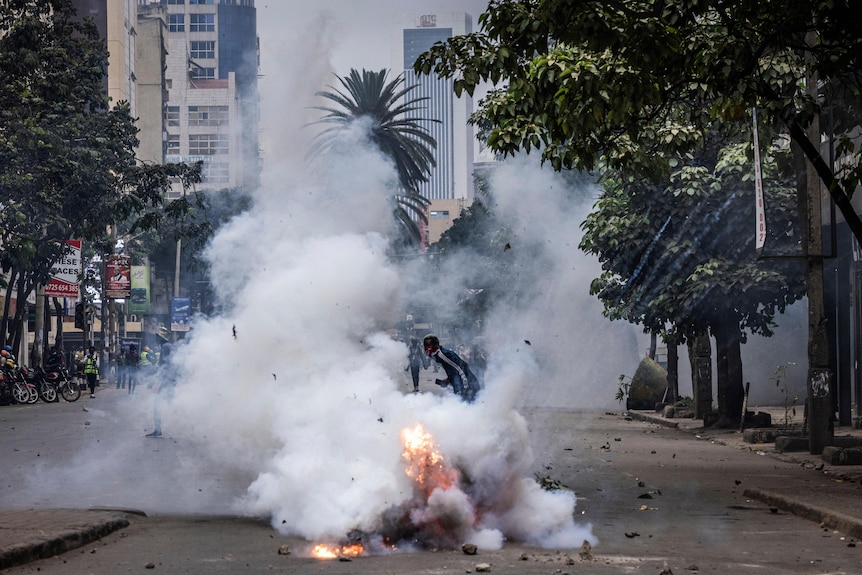
Police were seen hurling tear gas cylinders to break up the demonstrations.(AP: Ed Ram)
Officials say the protests have been infiltrated by organised criminal gangs and must be shut down until further notice.
On Tuesday, police were seen hurling tear gas cylinders to break up the demonstrations as businesses stayed closed.
"We have credible intelligence that organised criminal groups are planning to take advantage of the ongoing protests to execute their attacks, including looting," new Chief of Police Douglas Kanja Kiricho said in a statement late on Wednesday.
"No demonstrations will be permitted in the Nairobi Central Business District and its surroundings until further notice to ensure public safety."
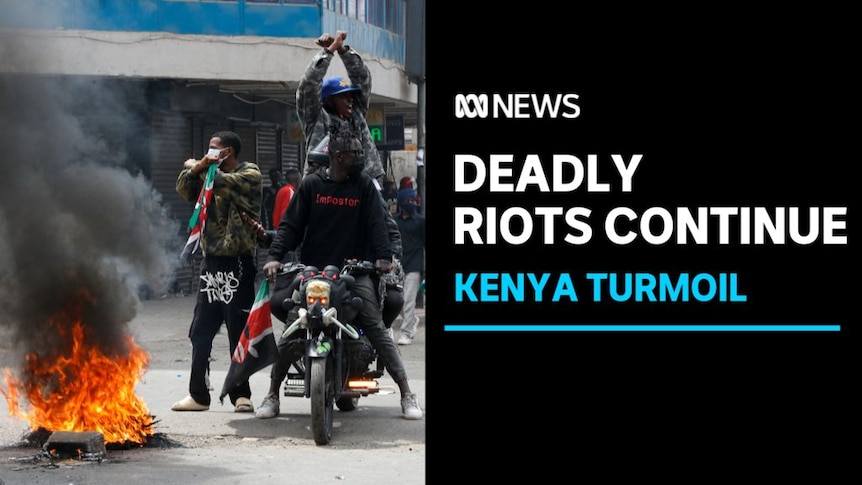
In short:
Kenya's police have banned demonstrations in the heart of the capital Nairobi after weeks of anti-government protests.
President William Ruto fired almost all of his cabinet last week in response to activists' demands surrounding a bill which would raise taxes, but demonstrations continued.
What's next?
Leading figures behind the protests have rejected an offer for "multi-sectoral" talks and have called on people to gather at Uhuru Park adjacent to Nairobi's city centre.
Kenya's police have banned demonstrations in the heart of the capital Nairobi after weeks of anti-government protests.
Protests broke out on June 18 after legislators passed a finance bill that would raise taxes.
Demonstrators accuse Kenya's officials of incompetence, corruption and displays of opulence while ordinary people suffer from a cost-of-living crisis.
"We are asking genuine questions. Where is accountability? Where is governance?" protester Daniel Wambua says.
Activists have blocked major roads including the highway to Namanga on the outskirts of Nairobi, while demonstrations have also broken out in the towns of Mombasa, Kisumu and Eldoret.
Activists will not stop until president steps down
Police opened fire on demonstrators at parliament on June 25, killing several people.(AP: Ed Ram)
The rallies, organised online and led by youth activists, began peacefully but later turned violent.
At least 50 people have died and 59 have been abducted or declared missing since demonstrations began, according to The Kenya National Commission for Human Rights.
Some demonstrators briefly stormed parliament and began looting on June 25. The police opened fire, killing several people.
Last week, President William Ruto withdrew the legislation and fired almost all of his cabinet.
The head of the police, who has been accused of brutality toward the demonstrators, resigned last Friday.
Demonstrations continued, with activists saying they will not stop until Mr Ruto steps down.
Mr Ruto also pledged to set up a broad-based government last week, but the opposition coalition on Wednesday rejected the idea — calling instead for a constitutional convention.
Protests infiltrated by organised crime, officials say
Police were seen hurling tear gas cylinders to break up the demonstrations.(AP: Ed Ram)
Officials say the protests have been infiltrated by organised criminal gangs and must be shut down until further notice.
On Tuesday, police were seen hurling tear gas cylinders to break up the demonstrations as businesses stayed closed.
"We have credible intelligence that organised criminal groups are planning to take advantage of the ongoing protests to execute their attacks, including looting," new Chief of Police Douglas Kanja Kiricho said in a statement late on Wednesday.
"No demonstrations will be permitted in the Nairobi Central Business District and its surroundings until further notice to ensure public safety."
Deadly riots continue in Kenya as President Ruto urged to resign
"(The police and Mr Ruto) have no power to suspend rights guaranteed by the constitution," activist Boniface Mwangi wrote on the social media platform X in response to the protest ban.
The Communications Authority of Kenya (CA) has cautioned the media against "perpetuating" violence in their coverage of the protests, "which could potentially cause widespread civil unrest in the country".
Some outlets have "compromised objectivity and balance in the reporting of crime, security operations and/or crisis situations", CA chief David Mugonyi wrote in a Wednesday letter to a media executive seen by Reuters.
Mr Ruto's office planned "multi-sectoral" talks for this week to address the protesters' grievances, but by Thursday there was no sign they had begun.
Most of the leading figures behind the protests have rejected the invitation.
Some activists called for people to gather on Thursday with camping gear to "occupy" Uhuru Park adjacent to the city centre, amid a heavy police presence across Nairobi.
Reuters/ABC
"(The police and Mr Ruto) have no power to suspend rights guaranteed by the constitution," activist Boniface Mwangi wrote on the social media platform X in response to the protest ban.
The Communications Authority of Kenya (CA) has cautioned the media against "perpetuating" violence in their coverage of the protests, "which could potentially cause widespread civil unrest in the country".
Some outlets have "compromised objectivity and balance in the reporting of crime, security operations and/or crisis situations", CA chief David Mugonyi wrote in a Wednesday letter to a media executive seen by Reuters.
Mr Ruto's office planned "multi-sectoral" talks for this week to address the protesters' grievances, but by Thursday there was no sign they had begun.
Most of the leading figures behind the protests have rejected the invitation.
Some activists called for people to gather on Thursday with camping gear to "occupy" Uhuru Park adjacent to the city centre, amid a heavy police presence across Nairobi.
Reuters/ABC
July 18, 2024
By Associated Press
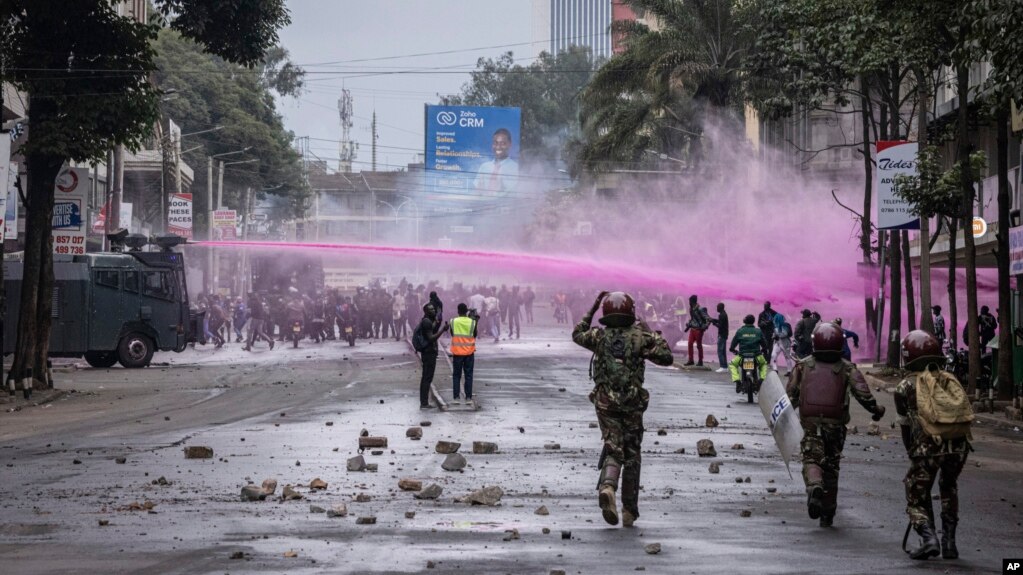
Police fire water canons during a protest in Nairobi, Kenya, July 16, 2024.
Police in Kenya on Thursday have banned protests in the capital indefinitely citing a lack of leadership that would ensure peaceful protests.
The ban was announced hours before a planned protest later Thursday, in which demonstrators were expected to march to the president's office calling for his resignation over poor governance.
Acting police inspector general, Douglas Kanja, in a statement said the lack of leadership had "made it difficult to enforce safety protocols."
Recent protests have left businesses counting losses after the lootings and burnings.
Protesters were yet to be spotted Thursday but major roads leading to the president's office remained barricaded by the police.
Kenya has seen a month of protests that started with calls for legislators to vote against a controversial finance bill that was proposing higher taxes amidst a cost-of-living crisis and ballooning public debt.
At least 50 people have died since the protests began on June 18, according to the Kenya National Commission on Human Rights.
President William Ruto said he would not sign the finance bill that was passed by parliament on June 25 — the day protesters stormed and burnt part of the building, prompting legislators to flee. The president last week dismissed almost his entire Cabinet and the attorney general, as demanded by protesters who accused ministers of incompetence, corruption and display of opulence.
Some businesses in Nairobi remained closed on a rainy morning in anticipation of planned protests Thursday. Police remained heavily deployed around the central business district patrolling the streets.
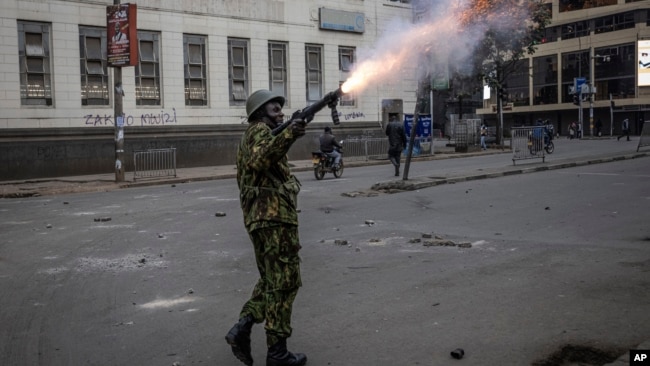
Police in Kenya on Thursday have banned protests in the capital indefinitely citing a lack of leadership that would ensure peaceful protests.
The ban was announced hours before a planned protest later Thursday, in which demonstrators were expected to march to the president's office calling for his resignation over poor governance.
Acting police inspector general, Douglas Kanja, in a statement said the lack of leadership had "made it difficult to enforce safety protocols."
Recent protests have left businesses counting losses after the lootings and burnings.
Protesters were yet to be spotted Thursday but major roads leading to the president's office remained barricaded by the police.
Kenya has seen a month of protests that started with calls for legislators to vote against a controversial finance bill that was proposing higher taxes amidst a cost-of-living crisis and ballooning public debt.
At least 50 people have died since the protests began on June 18, according to the Kenya National Commission on Human Rights.
President William Ruto said he would not sign the finance bill that was passed by parliament on June 25 — the day protesters stormed and burnt part of the building, prompting legislators to flee. The president last week dismissed almost his entire Cabinet and the attorney general, as demanded by protesters who accused ministers of incompetence, corruption and display of opulence.
Some businesses in Nairobi remained closed on a rainy morning in anticipation of planned protests Thursday. Police remained heavily deployed around the central business district patrolling the streets.

A police officer fires tear gas during a protest in Nairobi, Kenya, July 16, 2024.
Police have been accused of brutality against protestors. On Friday, Japhet Koome, the former inspector general of police, resigned after calls from demonstrators for him to take responsibility for the shooting of protesters.
The Independent Policing Oversight Authority on Wednesday said it had forwarded four out of 10 cases of police brutality to the director of public prosecutions with recommendations.
The watchdog had recorded witness statements and directed that various police officers appear before it to give their testimony.
Kenyan police officers have in the past been accused of brutality and a contingent of 400 officers is currently in the Caribbean nation of Haiti leading a UN-backed police mission to combat gang violence.
Police have been accused of brutality against protestors. On Friday, Japhet Koome, the former inspector general of police, resigned after calls from demonstrators for him to take responsibility for the shooting of protesters.
The Independent Policing Oversight Authority on Wednesday said it had forwarded four out of 10 cases of police brutality to the director of public prosecutions with recommendations.
The watchdog had recorded witness statements and directed that various police officers appear before it to give their testimony.
Kenyan police officers have in the past been accused of brutality and a contingent of 400 officers is currently in the Caribbean nation of Haiti leading a UN-backed police mission to combat gang violence.
No comments:
Post a Comment